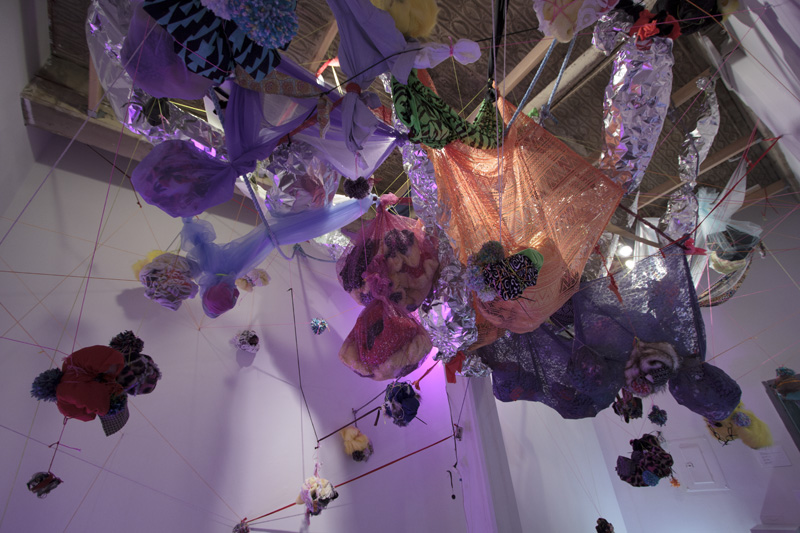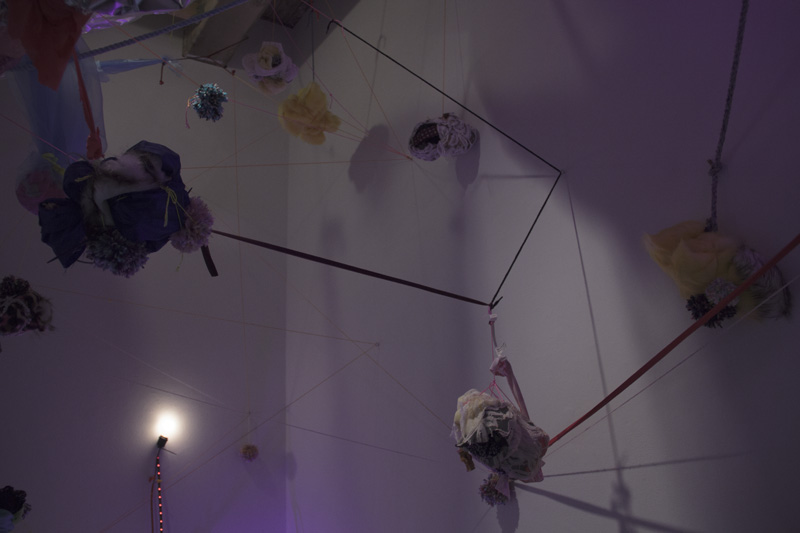Tyler Kline
The Golgi Apparatus
April 2018
Grizzly Grizzly is pleased to announce our April exhibit, The Golgi Apparatus, a site-specific installation by Philadelphia artist and curator, Tyler Kline. Kline’s interpretation of a Golgi apparatus will be suspended above the floor, extending into the walls and ceiling of the exhibition space. The viewer will be able to walk under the apparatus, peer into the orifices, and watch moments of video transmission, kinetic machinations, traces of infrared, ultraviolet and visible radiant energy.
A Golgi apparatus is a microscopic cellular level protein generator and organizer that distributes the protein building blocks of the human body. As the impetus for his installation, Kline proposes the Golgi apparatus as a metaphoric expression of the macroevolution of the 21 st century post-human condition. Kline describes his sculptural interpretation of the Golgi apparatus as “a return to intuitive process, memory, and psychological attachment to pattern, place and chroma. The concept is that of an organic apparatus, echoing the form of a gigantic cell nuclei, materialized within the gallery as if sprung from a macro-petri dish. Clues to the apparatus’ origin and intent will be revealed through video, artifacts, and ciphers.”
Kline employs a bricolage of materials and methods to create his new immersive installation. The installation is comprised of wood, charester foam, installation foam, aluminum foil, fake fur, and string. Construction processes run the gamut of hand modeling/carving to CNC milling, 3D printing, and laser cutting; with the exterior skin of the membrane made up of fabrics from a long term textile collection derived from the iconic Gaffney Fabrics, located in the Germantown section of Philadelphia. Kline’s use of 3D printing, laser cutting, hand modeling, video, construction materials and textiles are both discursive and intuitive byproducts of his diverse background in sculpture, installation, painting, architecture and anthropology.
Artist Bio
Tyler Kline is a curator and artist living and working in Philadelphia. Kline grew up in Stone Mountain, GA, studied Architecture and Painting at the Savannah College of Art and Design. He received his BA in Anthropology and Sculpture from Portland State University and a MFA in Installation and Sculpture from The Pennsylvania Academy of The Fine Arts.
Kline has worked in the sphere of urban interior and exterior intervention for two decades, beginning with creating skate-parks in unused urban spaces in Atlanta, to creating a sculpture garden in the shadows of re-purposed textile mills through Little Berlin, in Philadelphia. He makes immersive installations and netart, and creates animated gifs as a way of exploring and constructing glitch theory. Kline’s own point of research within this field is to break the conceptual screen and expose the underlying subjective and internal forces that are imprisoned by late stage capitalism.
In his ongoing work as a visual artist, Kline has created installations for Rebeka Templeton Contemporary, Little Berlin, Vox Populi, University of The Arts, Pennsylvania Academy of Fine Art, and the Institute of Contemporary Art in Philadelphia; Dumbo Art Center and The Armory Show in NYC; Washington County Museum of Fine Art, Hagerstown, MD; The Delaware Art Museum, MASS MoCA, Portland State University, Savannah College of Art and Design, New Bedford Art Museum, the Goethe Institute of San Francisco, and Disjecta.
Kline’s curatorial work braids visual anthropology with cross-disciplinary aesthetics, with an interest in emerging media and scientific cross-pollination. A strong believer in the power of art to revitalize communities and bring about social change; he is fascinated by playing with the porous boundaries between painting, video, sculpture, performance, and printmaking. Kline has curated exhibits at: Atlanta’s Moving Spirits Gallery; Portland’s Martial Arts Gallery, Zeitgeist and Disjecta; as well as Philadelphia’s Pennsylvania Academy of the Fine Arts, Little Berlin, Crux Space, and the University of the Arts.










